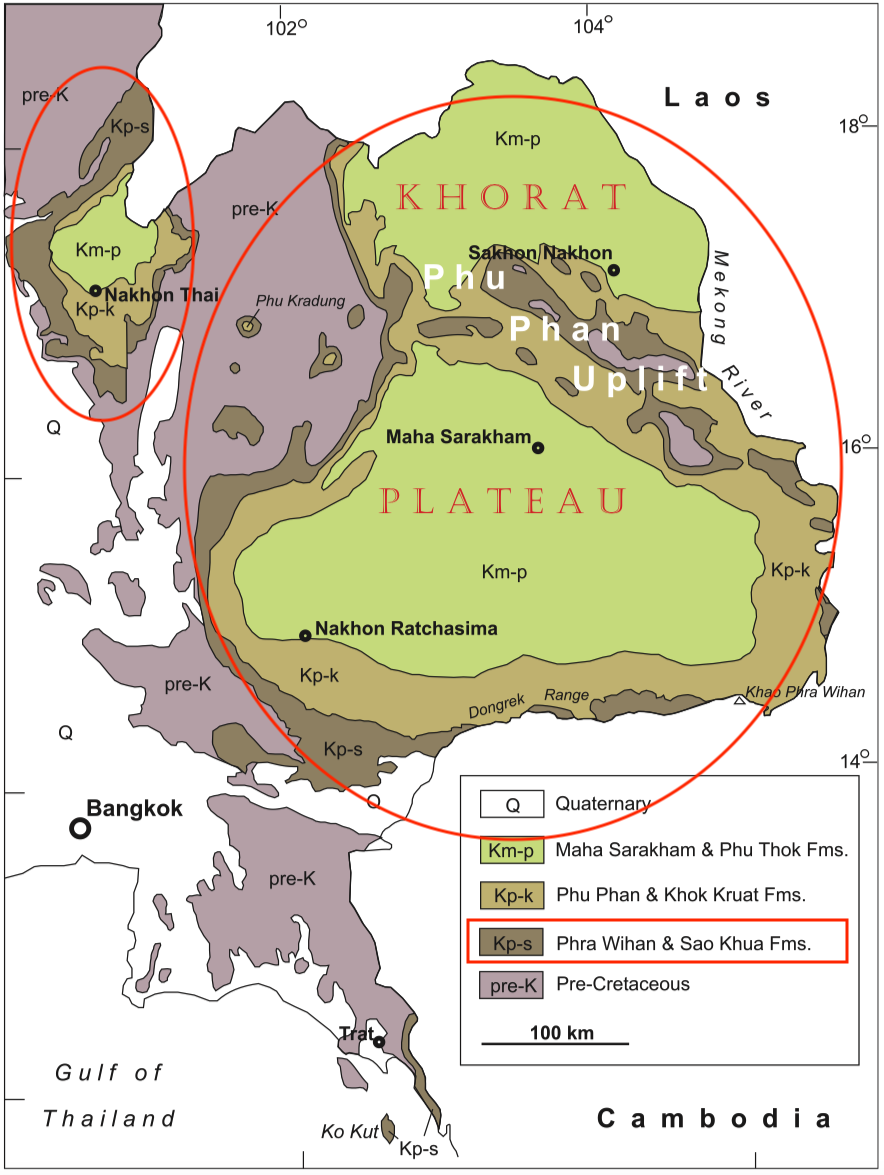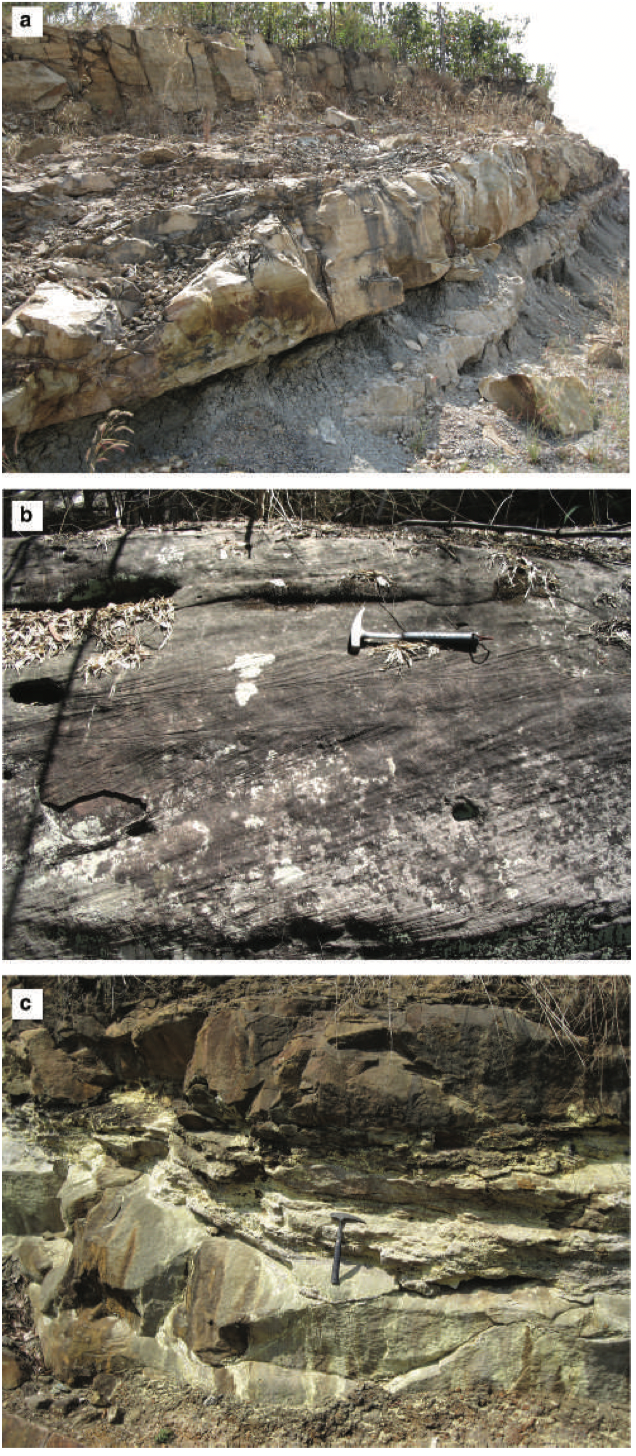Phra Wihan Fm
Period:
Cretaceous
Age Interval:
Early Cretaceous (13, 14, 15)
Province:
Indochina Block: Khorat Plateau, Indochina Block: Loei Fold Belt
Type Locality and Naming
Southern slope of Khao Phra Wihan of Khorat Plateau. Parent unit: Khorat Gr.
Synonym: หมวดหินพระวิหาร
[Figure: NE and SE Thailand, showing distribution of Cretaceous outcrops. (Meesook, 2011. Page 170). At least some of the Pre-Cretaceous sedimentary rocks on the map may be Jurassic and the position of the Jurassic-Cretaceous boundary is discussed in Meesook (2011).]
Lithology and Thickness
Generally, the rocks consist of light buff to grey, fine- to coarse-grained quartzitic sandstones and rarer siltstones and mudstones with occasional conglomerates. Sandstone conglomerates are locally exposed, particularly along Highway 213 (Kalasin–Sakhon Nakhon) (Meesook, 2011). Thickness: 100–250 m
[Figure: Phra Wihan Formation in NE Thailand. (a) Road-cut outcrop of quartzitic sandstone in Nongbua Lamphu Province; (b) conglomeratic and quartzitic sandstone in Chaiyaphum Province; and (c) conglomeratic sandstones with lignite jet layers in Khon Kaen Province (Meesook, 2011).]
Lithology Pattern:
Coarse-grained sandstone
Relationships and Distribution
Lower contact
Phu Kradung Fm (conformable) (In the northern and central parts of the Phu Phan Range, the formation overlies claystones of the Phu Kradung Formation with a distinctively sharp contact (Meesook, 2011).)
Upper contact
Sao Khua Fm (conformable)
Regional extent
The Khorat Plateau. The Phra Wihan Formation is widely distributed, occurring in the Phu Phan Range and around the western and particularly the southern rims of the Khorat Plateau. Along the southern rim it forms the Dongrek Range which marks the border with Cambodia and includes the temple mountain of Khao Phra Wihan after which the formation was named (Meesook, 2011).
GeoJSON
{"type":"Feature","geometry":{"type":"Polygon","coordinates":[[[100.86,17.97],[100.84,17.82],[100.73,17.64],[100.5,17.26],[100.28,16.84],[100.18,16.41],[100.28,15.88],[100.48,15.55],[100.45,15.3],[100.53,14.96],[100.66,14.73],[100.91,14.5],[101.11,14.45],[101.51,14.44],[102.13,14.69],[102.42,14.84],[102.67,14.92],[102.84,14.96],[103.08,14.98],[103.24,15.04],[103.43,15.12],[103.51,15.18],[103.65,15.34],[103.72,15.57],[103.73,16.03],[103.66,16.46],[103.45,16.87],[103.16,17.27],[102.66,17.53],[102.29,17.74],[101.89,17.99],[101.7,17.96],[101.63,17.81],[101.48,17.81],[101.34,17.66],[101.16,17.49],[100.98,17.53],[100.93,17.66],[100.99,17.81],[101.1,17.99],[100.86,17.97]]]}}
Fossils
After the predominantly meandering-river and lacustrine environment of the Phu Kradung Formation, the mainly braided-river environment of the Phra Wihan Formation saw a less abundant and less diverse fauna and flora. Plant remains and a few vertebrate fragments are found in the conglomerates. A large dinosaur trackway has been found on a sandstone bedding plane of the Phra Wihan Formation at Phu Faek, Kalasin Province. Although many theropod dinosaur footprints are found in the Phra Wihan Formation at Phu Wiang (Buffetaut & Suteethorn 1993) and Phu Faek (Buffetaut et al. 1997), most of them cannot be identified in detail and have no clear biogeographical implications (Buffetaut & Suteethorn 1998).
Age
The Phra Wihan Formation is dated as Lower Cretaceous (ca. Berriasian to Barremian) by Racey et al. (1994, 1996) and Racey & Goodall (2009) on the basis of the palynomorphs Dicheiropollis etruscus, Corollina spp., Cicatricosisporites augustus and C. dampieri collected from near the base of the formation. Previously considered as Middle Jurassic. Spans late Berriasian-Hauterivian following Booth, J. & Sattayarak N., 2011, Chapter 9 Subsurface Carboniferous-Cretaceous geology of NE Thailand.
Age Span:
Beginning stage:
Berriasian
Fraction up in beginning stage:
0.5
Beginning date (Ma):
142.56
Ending stage:
Barremian
Fraction up in the ending stage:
0
Ending date (Ma):
130.77
Depositional setting
Braided river.
Depositional pattern:
Additional Information
Phra Vihan Formation was previously used (La Moreaux and others, 1959; Ward and Bunnag, 1964).
Compiler:
Wen Du - modified from- Meesook A., 2011, Chapter 8 Cretaceous in Ridd, M.F., Barber, A.J., and Grow, M.J., editors, The Geology of Thailand, Geol. Soc. of London; Booth, J. & Sattayarak N., 2011, Chapter 9 Subsurface Carboniferous-Cretaceous geology of NE Thailand in Ridd, M.F., Barber, A.J., and Grow, M.J., editors, The Geology of Thailand, Geol. Soc. of London; Lexicon of Stratigraphic Names of Thailand of 2013.

